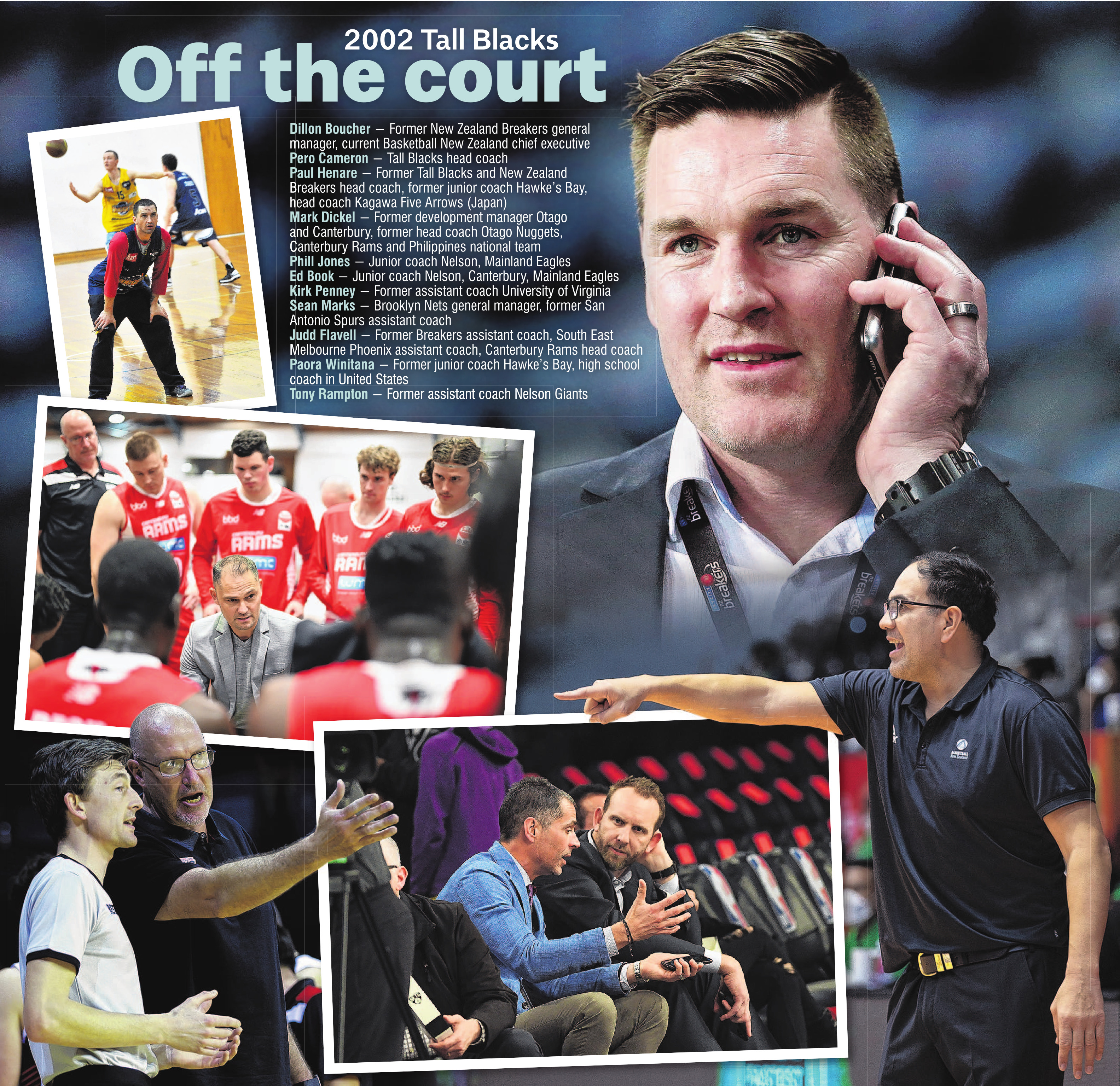
The years ticked by.
Indy became a memory moving further and further into the distance.

Many of those 2002 Tall Blacks went on to forge impressive careers over the next decade.
They never quite reached the heights of that world championships campaign in the black singlet again, placing-wise at least.
But perhaps just as significant as their legacy on court was the one they forged off it.
When they all returned to New Zealand at the end of their playing days, the majority of that squad took up coaching or management.
That has ranged from the NBA, to the Tall Blacks, right down to those involved at a community level.
"I think what you’ve found with that group is we had some really high-IQ basketball players on that team," Basketball New Zealand chief executive and 2002 Tall Black Dillon Boucher said.
"I think that was just by default. [2002 Tall Blacks coach Tab Baldwin] did a really good job of identifying those guys that had great IQ.
"His systems were so complex that you had to have a high basketball IQ to survive on his teams.
"We had a playbook as thick as the Bible — there were so many plays to learn. If you couldn’t learn them, you couldn’t be a Tall Black.
"So all the guys on the team were high-IQ basketball players. That’s why you’re seeing a lot of the ones who were on that team are either coaching or administering in the sport."
It was around the early- to mid-2010s that basketball seemed to take a jump, quality-wise, in New Zealand.
The depth of talent being produced and dispensed around the world increased dramatically. That was obviously not just down to the 2002 team.
But many of those players returned with their experiences of how basketball operated in the world’s elite leagues.
Now they were able to bring that back and pass it all on to the next wave of New Zealanders.
"My thing has always been showing people how to train, and how hard you have to train in order to be good," 2002 Tall Blacks point guard and Otago great Mark Dickel said.
"Then you have to consistently perform over years in order to reach your potential. So many of us in that team had no fear of the teams we were playing.
"When all of us started coaching post our playing career, it became important to instil the fearless confidence that we had as a Tall Blacks team. This is what Tab and Nenad [Vucinic] helped give us."
Dickel, whose 4.6 assists per game were second-highest in the 2002 world championships, returned to Dunedin in late-2011.
He spent the next three years as Basketball Otago’s director of development, while winding down his playing days with the Otago Nuggets.
That was followed by a similar role in Christchurch, while head coaching the Canterbury Rams, before moving on to coach both the national team and in the top professional league in the Philippines.
His time in Dunedin coincided with Otago’s most successful period in age-group basketball of modern times.
The region’s representative teams were consistently among the best in the country, while many of the top present-day Otago players have cited Dickel’s influence in their development over the years.
He was not the only coach to contribute to that era’s success — think Brent Matehaere, Gavin Briggs, Todd Marshall, Dean Ruske, Greg Brockbank and Alf Arlidge, among others.
But the 2002 influence was clearly there — as it was, and has been, in various other places around New Zealand.
Dickel, who is now based in Las Vegas, felt the players New Zealand was developing had improved.
That was a notable change he had seen over the past 20 years.
"The biggest one is that players now are so much better," he said.
"They are more skilled and understand basketball much better than when I was coming up. They train harder and have better skill coaching.
"Basketball is a true world game now. Even in our country, it is firmly established."
The flow-on effect of that has been the increasing number of players reaching higher levels around the world.
Last year, there were over 120 New Zealanders playing college basketball in the United States.
In recent years, there has been as many as 20 playing men’s division one — at times in the 2000s, that number was as low as one.
That trickle to the United States turned into a flood about a decade ago, and many of those players have returned in recent years.
Alongside an increasingly deep national league, there were 19 New Zealanders playing in last year’s highly-rated ANBL, while others are playing in top leagues around the world.
Dickel felt there were pathways in place to make college recruitment easier now, although added that the quality New Zealand had to offer had also risen.
He said the challenges remained the same as when he left for his own college experience in the mid-1990s, at the University of Nevada Las Vegas.
"It is easier to be recruited now.
"However, there are much more talented young players coming out of New Zealand also. Colleges know we have many talented players in New Zealand.
"My thoughts on this have not changed since before I went to UNLV. You have to be tough if you want to go to college and play well.
"You have to beat out all the other players at your spot then continue to play well enough to keep them on the bench.
"College is very hard if you don’t play."
Despite the rise in talent stocks, the Tall Blacks have never approached a top-four finish at a world cup since 2002.
Perhaps that again illustrates the impressive nature of the 2002 campaign.
— FRIDAY: How women’s basketball developed
— FRIDAY: Mulligan on the ‘product’
— SATURDAY: Where to from here?



![Toby Lewis [Mid City Magic] is blocked by Patrick Tipene [City Rise Bombers] during a Men's Club...](https://www.odt.co.nz/sites/default/files/styles/odt_landscape_small_related_stories/public/story/2025/08/basketball_240525.jpg?itok=ClU4923c)






